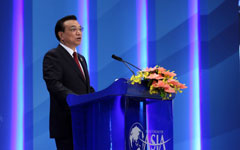Since the first round of talks was held in Brunei in May 2013, there have been four rounds of negotiations in all. In the first three rounds of talks, participating countries reached preliminary consensuses in the areas of tariff concessions, rules of origin, customs procedures and trade facilitation, among others. In the latest round of negotiations, progress was made on a range of issues including goods, services, investment and the agreement framework. Nonetheless, Chinese delegation leader Wang Shouwen, assistant minister of the Ministry of Commerce, said the RCEP negotiations remain a daunting task due to the different development levels and varied stances among the participating countries.
 |
 |
Accordingly, each country will inevitably seek maximum protection for their own vulnerable sectors in the negotiations, thus making the process more difficult.
Furthermore, the RCEP is mainly based on bilateral FTAs among the participating countries. In the absence of some important FTAs, the RCEP negotiations will not make a breakthrough any time soon. Although ASEAN has already signed FTAs with the other six countries, some of them have yet to clinch deals among themselves, including those between Japan and South Korea, China and Japan, India and New Zealand, and China and India.
The RCEP, rather than a blanket agreement, should be a phased-in arrangement that accommodates member countries at different levels of development. While catering to the differences among the 16 countries and providing special policies for the least developed members of ASEAN, the RCEP negotiations could focus on those areas where a consensus can be reached more easily - similar to the "Early Harvest Program" of the ASEAN-China FTA - so that participating countries can enjoy the benefits as early as possible and will be willing to promote follow-up deals.
The authors are writers with Xinhua News Agency.
